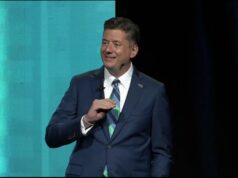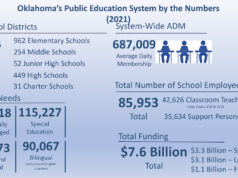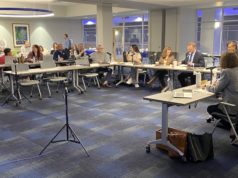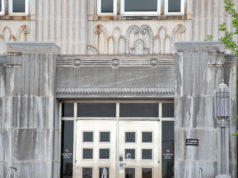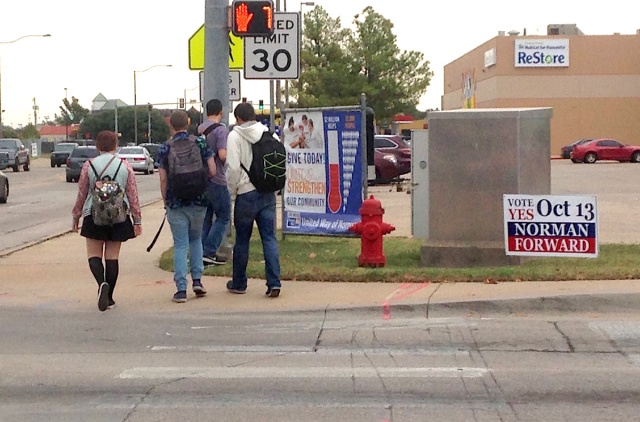

(Editor’s Note: This story was corrected to identify Norman’s potential purchase of Griffin Community Park properly.)
Norman residents will vote Tuesday, Oct. 13, on whether to impose 15 years worth of an extra half-cent sales tax that would finance new amenities and the acquisition of state property available to the city.
Called “Norman Forward,” the proposal would raise an estimated $200 million for a slew of projects, including new indoor-activity centers, new libraries, new and renovated parks and the likely purchase of the George M. Sutton Wilderness Park and Griffin Community Park, both of which are currently owned by the state and leased by the city.
Needing only a simple majority to pass, the package is endorsed by the Norman Chamber of Commerce, the Red Earth Group Sierra Club affiliate and others.
“If you’ve got the Sierra Club and the Chamber of Commerce both supporting something, it’s probably a pretty good package,” said Norman Chamber President and CEO John Woods.
Woods said his board voted 30-0 in unanimous support of Norman Forward, which he said is “not common.”
“Typically we’ll have a few yes’s or no’s. Whatever the majority is, there’ll be a few people going the other way,” he said. “But this was pretty overwhelming by our board.”
If a broadly inclusive municipal public-investment package sounds familiar, perhaps you’ve heard of MAPS about 20 miles north of Norman in Oklahoma City. Now gearing up for a possible fourth installment, MAPS revolutionized OKC’s trajectory starting in 1993, but it was borne out of a great blow to city leaders’ development efforts: the failure to land a United Airlines plant, owing largely to the perception there was nothing to do in OKC.
Fast forward into the new millennium: Norman Forward sprang from the ashes of a failed 2008 Norman bond vote to fund a new library, the only one of four bond measures to fail that ballot.
“After kind of healing bruises in that time frame, groups got together,” said Woods, who has been with the Chamber nearly five years. “Even before I came onto the chamber, there were a lot of folks talking about trying to get some sort of quality-of-life initiative on the ballot.”
Groups worked together and presented a proposal to the City Council, Woods said. Polling and public discussion resulted in a proposed “Expo Center” being trashed from the proposal, and, after a few other tweaks, the October ballot date was set.
“I am for it,” said Ward 7 City Councilman Stephen Tyler Holman. “It is not a prefect proposal, but we spent several months examining each individual project and had a lot of opportunity for public participation in the process. In the end, everyone is not getting everything they might have wanted, but most, if not all, Norman residents will benefit from these projects in some way.”
While Woods said there does not appear to be a coordinated opposition to Norman Forward, some citizens have expressed concerns over the project’s scope, development and operations.
“My big issue is largely how this particular sausage was made,” said OU philosophy professor Stephen Ellis, who considered himself an undecided voter Monday. “The city didn’t allow for much room (to move) away from the package that was started with.”
Ellis said he is “leaning yes” owing to the nature-park components, and he was glad to see the Expo Center get the boot.
“I thought that was sort of a boondoggle,” he said. “It was basically an expenditure of public money for a private gain.”
Similarly, Ellis said he wants to know exactly how Norman’s new sports and activity facilities would operate so as to guarantee public access for everyone, since a sales tax is paid by all citizens.
“Who pays for access to whom for what?” he asked of future admission or membership fees. “I figure an expenditure of funds that are collected for everyone should be available for everyone, or the collection of funds should go from rich to poor instead of from poor to rich.”
Ellis teaches philosophy of economics and philosophy of social sciences, and he said the reliance on sales tax as a funding mechanism can be controversial.
“I do think that going to sales taxes is a problem because a sales tax is regressive,” the father of two said. “This is a way of funding things that sort of disproportionately falls on the poor.”
Sales tax, however, is the form of revenue generation most palatable to the public, according to Woods, who reviewed city-polling numbers on taxation.
As a result, many initiatives may seek funding from sales tax increases in the coming year: a new Oklahoma County jail, the aforementioned MAPS 4 in OKC, and a potential boost to state education funding being championed by OU President David L. Boren.
“I’d much rather see the education one [pass] than the Norman Forward (proposal) because I think it’s a more important topic,” Ellis said.
But Ellis, of course, works in education. Holman, on the other hand, works in municipal politics.
“The State needs to stop cutting the income tax and start properly funding education,” Holman said of the potential education sales-tax initiative petition. “A sales tax is not the answer, and I am very disappointed that President Boren would propose such a thing.”
Ellis said he thinks property taxes should be the source of money for many of the revenues being discussed.
“People are scared to death of property taxes in Oklahoma, and I don’t know why,” he said.
From where he sits, Woods said Norman has a terrific opportunity to fund projects with sales taxes because “35 to 40 percent” of the sales tax base is from non-resident consumers.
“We’ve got a pretty good customer-base draw from a multi-county area,” the chamber president said. “Along with tourists and visitors and university (involvement), it becomes a big part of sales tax revenue.”
As for the potential education proposal?
“It’s going to be really interesting to see how that works out,” Woods said. “There are a whole lot of questions that I think remain on that proposal right now. (Is there) a trust in the Legislature to make sure the Legislature doesn’t off-set (the sales tax funding)?
“I think you would have to have that within the question somehow.”











